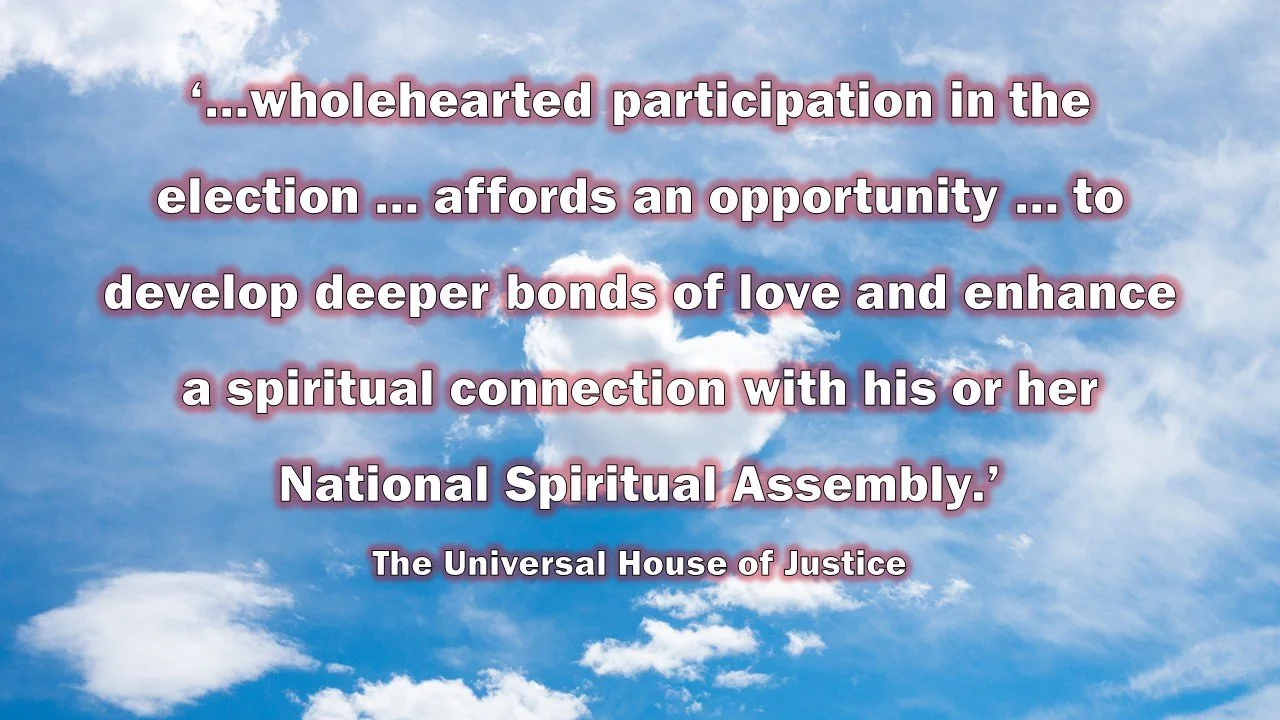Election season reminds us to promote unity
Local body elections are coming up, presenting an opportunity to review principles guiding Bahá’ís about political non-involvement. The primary relevant principle is that everything we do should promote unity, and a primary consequence of this principle is that we must not involve ourselves in partisan politics.
The Faith’s unique approach
Shoghi Effendi and the Universal House of Justice give very clear guidance enjoining Bahá’ís not to seek political office (such as standing in local and national elections) and calling on us to avoid getting pulled into partisan debates. It may seem that such restraints on political involvement might prevent us from effectively participating in the development of our society, so it is worth reflecting on how Bahá’ís can, in fact, best contribute to the welfare of the country by being true to the Faith’s unique approach.
Our duty to always promote unity arises from our awareness of the oneness of humankind, and this principle underpins the spiritual enterprise in which we are all engaged through the framework of the current Plan—an enterprise whose potentiality is greatly increasing as the bicentenary of the Birth of the Báb nears.
At the same time, as individuals we have an ongoing responsibility to serve society in our occupations, which may include working in government departments, among many other worthy kinds of jobs. Shoghi Effendi writes: “While vigilantly refusing to accept political posts, [the believers] should whole-heartedly welcome the chance to assume administrative positions; for the primary purpose of the people of Bahá is to advance the interests and promote the welfare of the nation …” (1)
We are also able to vote. Shoghi Effendi advises: “To enter the arena of party politics is surely detrimental to the best interests of the Faith and will harm the Cause. It remains for the individuals to so use their right to vote as to keep aloof from party politics, and always bear in mind that they are voting on the merits of the individual, rather than because he belongs to one party or another.” (2)
Embrace a broader vision
A further thing we can do is develop our ability to engage people in meaningful conversations that steer away from controversial debates and embrace a broader vision for resolving the critical problems of the day. This effort takes inspiration from Bahá’u’lláh’s words: “Be anxiously concerned with the needs of the age ye live in, and centre your deliberations on its exigencies and requirements.” (3)
Shoghi Effendi writes: “Let [the Bahá’ís] refrain from associating themselves … with the policies of their governments and the schemes and programmes of parties and factions. In such controversies they should assign no blame, take no side, further no design, and identify themselves with no system prejudicial to the best interests of that world-wide Fellowship which it is their aim to guard and foster.” (4)
Bahá’í concepts of leadership and consultation contrast in significant ways from methods of governance currently operating in the world. Building the Bahá’í system is a precious contribution to the future of the planet as it will increasingly demonstrate an alternative to the divisiveness that mars so much of current efforts to advance the human condition.
In the Bahá’í system that we are building as a model for moving away from adversarial politics, a key feature is the absence of the practices of nominations and campaigning for office. Shoghi Effendi states that “the mere act of nomination – leads eventually to the formation of parties – a thing which is totally alien to the spirit of the Cause.” (5)
And the Universal House of Justice writes that Bahá’ís “may serve on local councils if they do not campaign for office and are not required to undertake partisan political activities.” (6) These two conditions would generally be impossible to meet in the context of New Zealand local body elections, so the National Assembly asks the friends to refrain from standing for local Councils.
Changing hearts
Partisan politics relies on forceful debate and adversarial contest between different interest groups. However, in keeping with the goal of unifying humanity, the Faith of Bahá’u’lláh has from its very beginning, totally renounced forceful methods for achieving its aims. The Bahá’í community relies on the power of the Word of God. Our mandate springs from the mission given to Bahá’u’lláh in the Black Pit of Tehran:
“Verily, We shall render Thee victorious by Thyself and by Thy Pen. … Erelong will God raise up the treasures of the earth — men who will aid Thee through Thyself and through Thy Name, wherewith God hath revived the hearts of such as have recognized Him.” (7)
Further reading
Readers may be interested in an in-depth letter on the principle of non-involvement in politics, written on behalf of the Universal House of Justice on 27 April 2017. It is published in the Baha’i Reference Library of the Bahá’í World Centre.
Notes
Featured photo: Collonade detail of the Seat of the Universal House of Justice. Source: Bahá’í Media Bank (copyright © Bahá'í International Community).
(1) Shoghi Effendi, February 1927 to the believers throughout the East — translated from the Persian
(2) Shoghi Effendi, “Directives from the Guardian”
(3) Bahá’u’lláh, “The Tabernacle of Unity”
(4) Shoghi Effendi, “The World Order of Bahá’u’lláh”
(5) Shoghi Effendi, quoted in “Light of Divine Guidance” Vol. 1
(6) Letter on behalf of the Universal House of Justice to the National Spiritual Assembly of the Leeward Islands, February 15, 1982
(7) Bahá’u’lláh, “Epistle to the Son of the Wolf”






